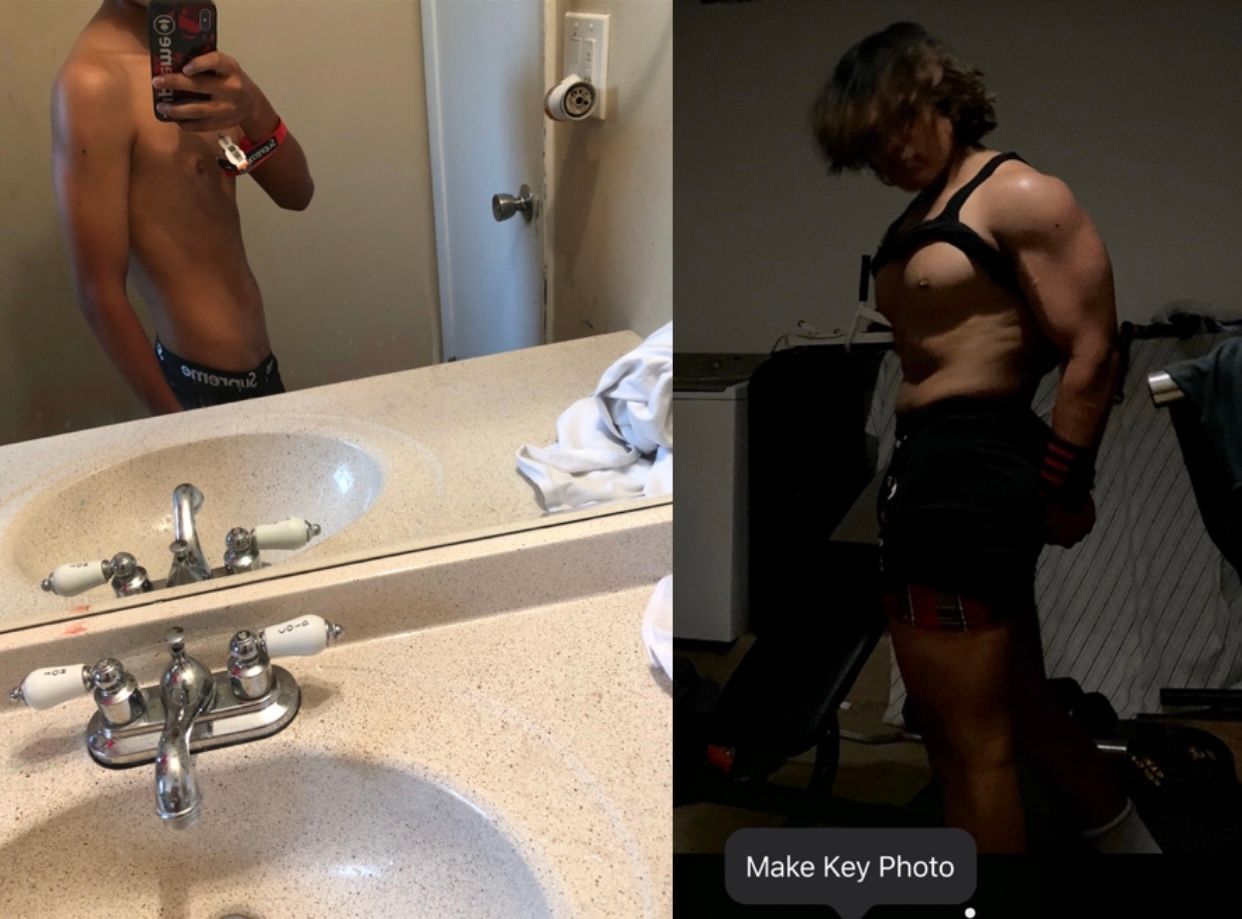Introduction
When I was 13 years old, I began feeling uncomfortable with the way I looked.
At 160 pounds, I felt unhappy and insecure about my body, which marked the start of my weight loss journey.
Looking back now, I wouldn’t recommend anyone so young—especially during puberty—to focus on losing weight unless they’re obese, as it can interfere with growth.
But at the time, I didn’t know better.
Like many others, I turned to the internet for answers, searching for the “best” diet to lose weight.
The advice I found was a battlefield of conflicting ideas:
“Carbs are the enemy!” some articles shouted.
“Cut the fat, and the weight will fall off!” others preached.
I chose to exile carbs from my life, convinced they were the villains. And while the scale budged, hunger roared louder than ever.
My clean, “perfect” meals felt more like a punishment than a path to freedom.
Determined to succeed, I sought out a fitness coach who handed me a meal plan that read like a grocery list for a bodybuilder preparing for a competition:
White rice
Vegetables
Egg whites
Chicken breast
Sweet potatoes

As a 13-year-old, eating these plain, joyless meals felt like walking through a culinary desert.
I was allowed one cheat meal every Sunday, but this strict approach made it hard to see other kids eating whatever they wanted while I stuck to my bland meals.
Over time, one cheat meal turned into an entire cheat day.
I would devour everything on everything in sight and feel awful afterward, blaming myself for my lack of control.
To cope with the guilt, I turned to a darker solution: forcing myself to throw up.
It felt like hitting “undo” on my mistakes, but in reality, I was spiraling deeper into a destructive cycle—every weekend, I’d binge and purge, thinking it was “normal.”
Soon, this behavior carried over into the weekdays.
For nearly a year, I continued this destructive pattern, which led to severe weight loss.
The scale plummeted, and so did I. In less than a year, I dropped from 160 pounds to a skeletal 85.

Despite being extremely underweight, I always saw myself as fat. I became terrified of food, convinced it was my enemy and that eating anything would make me gain weight.
This mindset eventually led to anorexia—a disorder where people have an intense fear of gaining weight and a distorted perception of their body.
It took years to claw my way out of that dark place. I had to unlearn the lies:
That carbs are evil.
That fats are forbidden.
That eating clean means sacrificing joy.
After countless failed attempts and broken diets, I finally found the key—a way of eating that not only helped me rebuild my body, going from 85 pounds to a strong 185 but also gave me freedom.

This approach has transformed not only my life but also the lives of others, like my brother, who shed weight without feeling like he was chained to a bodybuilder’s meal plan.
But before I reveal this game-changing method, let’s first explore why most “diets” fail and what a sustainable, healthy lifestyle really looks like.
What Exactly is a Diet?
According to Google a diet refers to the food and drink a person regularly consumes, which can be either habitual or intentionally or structured for a specific purpose.
Diets can vary widely depending on cultural, personal, and medical factors. In a few words, a diet refers to the way someone eats.
Some of the most well-known diets include:
Keto: Low-carb, high-fat.
Paleo: Avoids grains, legumes, and dairy to mimic early human diets.
Low-Fat: Reduces fat intake while increasing protein and carbs consumption.
Low-Carb: Reduces carb intake while increasing protein and fat consumption.
Most diets have one thing in common: they involve cutting something out. This brings us to the heart of the problem.
Why Most Diets Suck?
1) Unrealistic Restrictions
Many diets require cutting out entire food groups or drastically reducing calorie intake, making them difficult to maintain.
Let's take a look at the keto diet it requires you to cut all carbs from your consumption not only is this tough because many people love bread, pasta, and fruits.
While it may work temporarily, it overlooks the benefits of carbs, such as:
Weight Management: Whole grains can help you feel fuller for longer.
Fuel: The body’s main energy source for the brain, heart, and muscles.
Digestion: Fiber from carbs supports gut health and regular bowel movements.
2) Overcomplication
Many diets introduce overly rigid rules such as:
Meal plans
Expensive ingredients
Hard to find ingredients
This makes them daunting to follow.
This complexity discourages consistency. As most people don't have time to cook.
Let's take a look at the Paleo diet it requires cocking every meal from scratch. Which can be exhausting for those with busy schedules.
3) Emotional Disconnect
Stress Eating: Cravings during emotional lows.
Food Guilt: A cycle of guilt and overcompensation after “cheating.”
Emotional Depravation: Obsessing over forbidden foods, which can lead to binge episodes
Food often serves as comfort, reward, or stress relief, and diets that don't address these emotional triggers leave individuals vulnerable to binge eating, guilt, or frustration when they "break the rules."
4) Hunger & Cravings
One of the biggest problems of "diets" is that: It leaves people feeling constantly hungry, deprived, or craving the very foods they are told to avoid.
Hunger and cravings are natural survival mechanisms and overly restrictive diets often trigger them—making the diet feel like a battle against the body.
Here are some of the reasons why cravings and hunger occur:
Caloric Deficits: Eating too little increases hunger hunger hormones(like ghrelin), driving you to eat more.
Nutritional Imbalances: Cutting out food groups (e.g. carbs or fats) can leave the body feeling unsatisfied, leading to cravings.
Psychological Depravation: When we're told we can't have something, our brain fixates on it, amplifying cravings.
5) Misleading Promises
"Lose 10 pounds in a week!" claims may work but harm long-term health.
Like I stated earlier it led me to anorexia.
Some might work but it's not sustainable here's why:
Rapid Weight Loss is Unsustainable: Losing weight too quickly can lead to muscle loss, metabolic breakdown, and nutrient deficiencies, making it harder to maintain progress.
Many diets prioritize rapid results over sustainable, long-term health.
They are designed as quick fixes rather than lifestyle changes, leading to temporary success followed by eventual failures.
This brings us to the next point:
The Problem with Dieting
I really—and when I say I really I mean I really—hate the word "diet" Why?
Because people often see dieting as a temporary state (e.g. "I'll diet until I lose 10 pounds") instead of a permanent shift in habits.
Well for many people this is not a lie because once the "diet" is over, they often return to old habits, regaining the weight.
This is often known as "yo-yo dieting" or "weight cycling", and refers to the cycle of repeated cycle of losing and regaining weight due to short-term, unsustainable dieting efforts.
Here is how it works:
Start a diet: A person begins a restrictive diet to lose weight quickly.
Lose weight: The diet works initially, but it's often too rigid or extreme to maintain long-term.
Diet Ends: The person reverts to old eating habits or binge eating due to feelings of deprivation.
Weight Gain: The weight returns—sometimes even more than before.
Repeat the Cycle: Motivated by frustration or guilt, they start another diet, and the cycle begins again.
I was guilty of this mindset too—the idea that once I lost the weight, I could go back to eating whatever I wanted.
And I did, but in the worst way possible. I fell into a vicious cycle of binge eating, then forcing myself to throw it all up just to feel “better.”
What I didn’t realize back then is something crucial: eating healthy isn’t a temporary fix; it’s a lifestyle.
It’s not about one month of discipline and then a free pass to return to old habits. It’s about creating balance, sustainability, and habits that stick for life.
After countless trials and countless diets—some that worked for a while and others that left me feeling worse—I finally discovered the BEST solution.
A way to build a truly healthy lifestyle, one that helped me not only lose weight but also gain weight the right way while building muscle and feeling strong.
And that solution is:
The 80/20% Rule.
To be Continued…
This newsletter was getting a bit lengthy, so I’ll pause here. But don’t worry—next time, we’ll take a deep dive into the 80/20 rule and how it can revolutionize your approach to eating. Stay tuned for part two!
Thank you for reading,
Oscar.
Follow me on X https://x.com/MindOfOs
